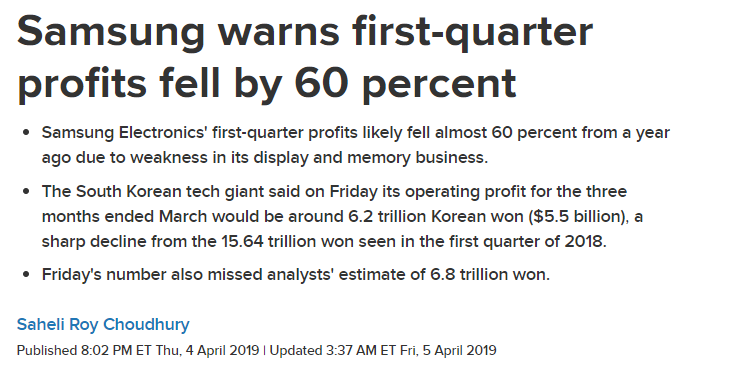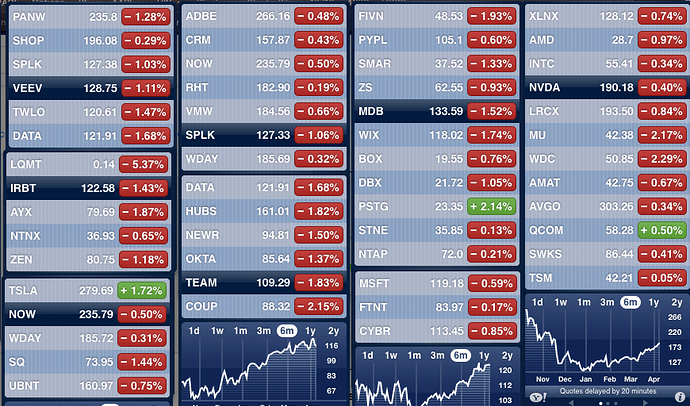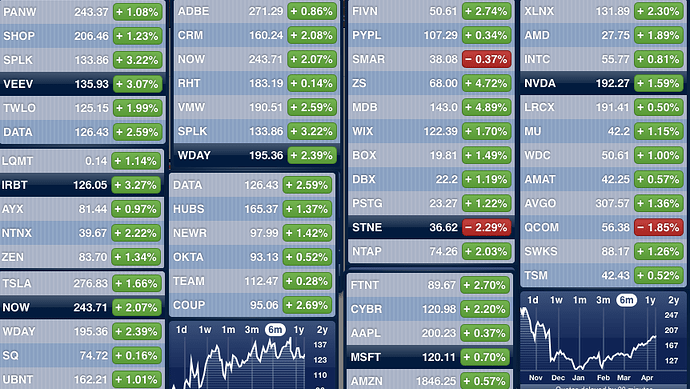All FAANGs will survive 10 years, but being an investor, if you go all in FAANGs (> 160B), will it give you better future or Other Stocks (10B-50B) will give better future?
In this case, even LYFT can grow from 24B to 240B in 10 years rather than AAPL grow 922B to 9.22T (including dividends).
The 10-20 year secular bull market is good if we buy all in SPY or QQQ (better) and hold for 10 or 20 years. This is exactly what WB said if we do not want to analyze the market/stocks
Here is one more update on Economy, Just copied from internet. Too Long To Read
Question: What is your reasoning to believe in an upcoming bear market? Apr 7, 2019
I’m trying to stay open minded and I am certainly not trying to time the market. I am trying to comprehend the market better. I see reasons why this market can keep proceeding upwards but I can’t find logical reasons for it to go downwards.
Answer:: Earnings are set to decelerate over the next few quarters. This comes at a time where we are seeing much more difficult YOY comps after a 3 year earnings bull market accelerated by unprecedented late cycle tax cuts.
There are still huge builds in semiconductor inventory as prices are shitting the bed. This comes at a time where many semiconductor CEO’s are suddenly global macro economists and telling everyone that the market will bottom in Q2. FWIW, semiconductor slowdown cycles have never lasted just one quarter, but the market seems to believe this narrative regardless.
Capex, which fueled a lot of this recent bull market (it certainly hasn’t been the consumer) is set to come down significantly for a variety of reasons.
First off, cloud technology, which has been the biggest winner in the last few years is becoming much more mature. It will still be relevant, but we’re far past the point where companies are just shifting towards expansion here.
Second, and this is very crucial, there are a LOT of companies sitting at a BBB credit rating. Those companies are going to be using their excess cash and revenues to pay down debt, not to increase capex since being downgraded to Junk would cause a lot of problems for them (while lowering their share price as well of course).
Third, notice the huge wave of IPO’s coming online? These are all companies that are non-profitable, and spend a huge amount of money in Capex. This has been funded by VC’s over the years on the premise that they can offload their shares to the public market at a profit based on the growth narrative. The issue is that once they’re in the public domain, they will have to be much more accountable to returns, and this will once again, increase pressure on growing towards profitability and decreasing their malinvestment / capex spending. This is a signature behavior of market tops.
The "internals" of the economy that I track (auto sector, housing, and some others) are all doing extremely negative right now. Auto sales have been trending downward for quite some time, and we’re now seeing the largest auto job cut announcements since the crisis. Housing has not been a good place to be either (not saying we’re in a bubble, but looking at performance of housing is a wonderful indicator of the cycle). Other sectors similarly have been kind of bad… transports have diverged in the bigger picture from the S&P 500. And to nobody’s surprise, a very typical late cycle dynamic has come into play where sectors that do well in "9th innings" are of course greatly outperforming right now.
International trade is shitting the bed, and this isn’t just a US-China trade war issue. South Korea exports have been sinking. European exports have been sinking. Japanese exports have been sinking. ETC, ETC. This is being reflected by ISM prints and a lot of very negative items.
Many people in the market legitimately thinks that the Chinese trade war is the biggest reason we’ve seen an enormous global slowdown. As a result, they keep buying based on the fact that Trump keeps dangling a trade war resolution. FWIW, I don’t think the trade war is positive of course, but there are many bigger problems than this out there.
All the positive items that have caused the markets to rally are based on the undying belief that central banks can and will backstop the markets at any cost. But this is a bit naive, and doesn’t reflect reality of these cycles. Most market tops are accompanied by central banks shifting to a much more dovish narrative and cutting rates.
Outside the USA’s borders, there are some enormous real estate bubbles… Canadian Real estate is a problem, Australian real estate is a bigger problem, and then there are other areas of the world such as Scandinavia, New Zealand, etc that all have their own real estate bubbles. Prices in these markets have been declining, and the marginal demand is gone. FWIW, most of the marginal demand came from Chinese capital flight, but the problem is that Xi has clamped down on capital flight x10 in order to stabilize China’s current currency situation as they stimulate. So even if we see a renewed boom in Chinese credit expansion, we will likely see the periphery real estate bubbles reflate along with this.
I’ve spoken ad nauseam about China on here, and I think it’s the biggest existential threat to the world economy. We used to be in a world where "if the USA sneezes, the world catches a cold". That’s still true, but we’re also in a situation where "If China Sneezes, the world catches a cold" given that they’re responsible for the largest increases in commodity demand and global growth since the GFC. And as I’ve mentioned China being in an enormous bubble, we’re all basically depending on them reflating their credit bubble in order to keep all of this going.
Similarly, Europe looks to be a mess, and they have little to no room to further stimulate without causing increasing currency pressures on the Euro and increased political pressures. Despite them stimulating, parts of Europe looks to already be in a recession (partially related to Chinese demand weakening) and a simple lack of overall growth. Europe’s banking sector looks atrocious, and their zombie corporations are weighing on productivity drastically. Despite this, Europe at least is cheap from an equity perspective, but that is likely for a good reason.
Yield curve has inverted, which can structurally cause further decrease in capex spending and lending to businesses around the country.
Late cycle employment tightness causes rising wages (Phillips curve). This is cutting into peak profit margins at a time where we are seeing some slowdowns in demand overall.
Beyond all of this, demographics are looking absolutely awful over the next 10-15 years for the world at large. Europe and China have demographics not too different from Japan before they had their big bust and deflation.
Overall, one of the biggest points I’ve been trying to make about this cycle is that the USA economy is likely to lag the rest of the world and follow the rest of the world into a recession type event. This is contrary to what we usually expect, where we lead the world into a recession in 2007-2009 and 2000-2002. We actually have a stronger likelihood of seeing a blowoff top type bubble in the USA coincident with a stronger dollar than most other countries, but that remains to be seen.
Either way, there is a ton more complexity out there, and even independent of all the risks, it’s still important to get the timing right. My main cue I’m watching is various signals in certain unemployment rate metrics. When this trends towards higher unemployment, you typically see shit hit the fan pretty quickly. We’re not quite there yet, but there are some problematic signs right now. Either way, I’ve trimmed a lot of risk and am pretty happy with being positioned heavily in treasury bonds right now.





